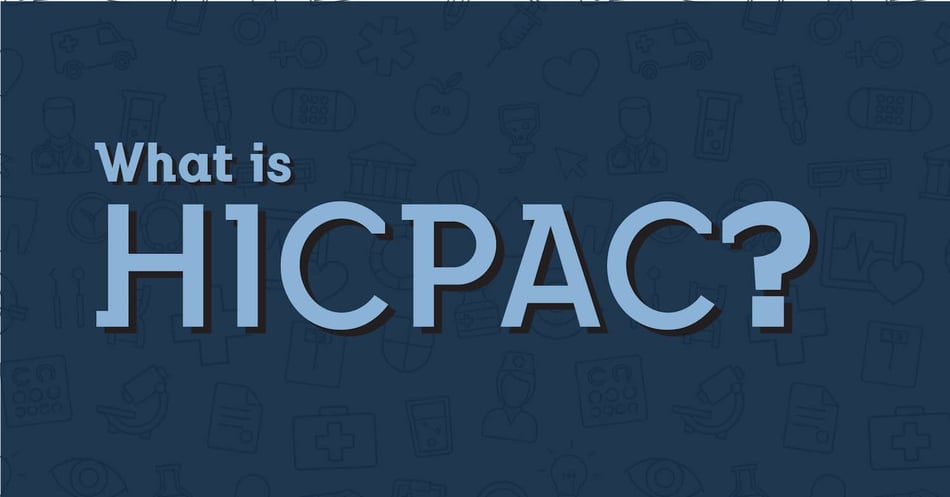What is HICPAC?

As of May 2025, HICPAC was terminated by the current administration. We adjusted this post to reflect HICPAC's past responsibilities and accomplishments, and hope for its reinstatement in the near future.
Our nation's history is one of change, as different administrations with different priorities take leadership of the Executive, Legislative and Judicial branches of the federal government. The first two decades of the new millenium were times of improving infection control and prevention in the United States, a time when new initiatives and federal agencies were brought together to solve a national health crisis. During this period, a rich variety of non-profit organizations supported our health and well-being, including groups whose sole focus was to eradicate HAIs . Today's post will explore one of the most important national groups formed during those critical years of our history to end preventable hospital-associated infections, most commonly known as HICPAC. Even though it is currently disbanded as the current administration makes sweeping cuts to the federal bureaucracy, it is still important to know about this group in hopes that future leaders will reinstate it.
Who was on the committee?
The Healthcare Infection Control Practices Advisory Committee (HICPAC) was a panel of experts that advised the Centers for Disease Control and Prevention (CDC) and the Department of Health and Human Services (HHS). The 14 voting members were appointed by the Secretary of HHS, but none are federal employees. They came from the fields of infection control, infectious diseases, healthcare epidemiology, healthcare-associated infections, health services research, public health policy, and other related fields. Members served for overlapping terms of up to four years. Non-voting members included representatives from various federal agencies and a rotating group of health-related non-profit organizations.
What did the committee do?
The charter for HICPAC stated the duties of the committee as providing advice and guidance to the Secretary, HSS as well as the directors of the CDC, the Office of Infectious Diseases (OID), the National Center for Emerging and Zoonotic Infectious Diseases (NCEZID), and the Division of Healthcare Quality Promotion (DHQP). This advice and guidance included information about infection control practices, surveillance strategies, antimicrobial resistance, and related events as they relate to all types of healthcare settings. Often, this support came in the form of guidelines, policy statements, and summaries of innovative strategies and technologies.
What are some examples of HICPAC's impact on the prevention of HAIs?
Recent contributions from HICPAC include guidelines for antibiotic stewardship in healthcare facilities. These guidelines help hospital administrators implement a program to evaluate use and abuse of antibiotics, as these medications are known to place the patient at risk for an HAI. With the increased outbreaks of infection related to contaminated endoscopes, HICPAC also developed and released documents to support best practices in endoscope reprocessing. Other reports, called systematic reviews, have covered topics such as C. difficile in the NICU and public reporting recommendations. Systematic reviews are a summary of all available evidence on a topic with national priority, highlighting research with significant impact, as well as revealing gaps requiring additional research.
How did HICPAC choose what to include in its advice and guidance documents?
One of HICPAC's most valuable contribution was meticulous research and scientific support for all recommendations. Before a policy, suggestion, guideline or strategy is proposed, it could be vetted by experts not only on the committee, but experts in the field. This means that any information in a HICPAC document could be trusted to stem directly from scientific evidence.
Can I see the committee in action?
Currently, no, since HICPAC was disbanded by the current administration. Previously, all HICPAC meetings were open to the public. Hopefully, this and many other important health-related groups and agencies will be reinstated soon.
We hope this brief summary has answered some questions about the importance of this group's work and it's vital role in our nation's health.
![EOScu Logo - Dark - Outlined [07182023]-01](https://blog.eoscu.com/hubfs/Eoscu_June2024/Images/EOScu%20Logo%20-%20Dark%20-%20Outlined%20%5B07182023%5D-01.svg)

![[infographic] Public Health Systems Download and share!](https://no-cache.hubspot.com/cta/default/216314/interactive-177841523491.png)



![Outpatient Services and Infection Prevention: Tracking Infections [Part 4]](https://blog.eoscu.com/hs-fs/hubfs/Small_Blog_Headers/Outpatient_Services-01.jpg?height=500&name=Outpatient_Services-01.jpg)